What is Dharmo Rakshati Rakshitah (correct) meaning | Good deeds fruits meaning
Namaste friends, how are you doing today? Welcome to #BhagavanBhakthi website / blog.
Bhagavan Lord Sri Krishna (Rama, Vishnu, Trivikrama, Narasimha) and Goddess Sri Rukmini (Sita, Lakshmi, Jaya, Maya) blessings to you and your family!
In this website / blog, you will always learn about #Hinduism #Sanskrit language.
Also subscribe to my YouTube channel from this link #BhagavanBhakthi to view videos about #Hinduism #Sanskrit language.
Just before going to “What is Dharmo Rakshati Rakshitah (correct) meaning | Good deeds fruits meaning“, let us have a brief some brief information.
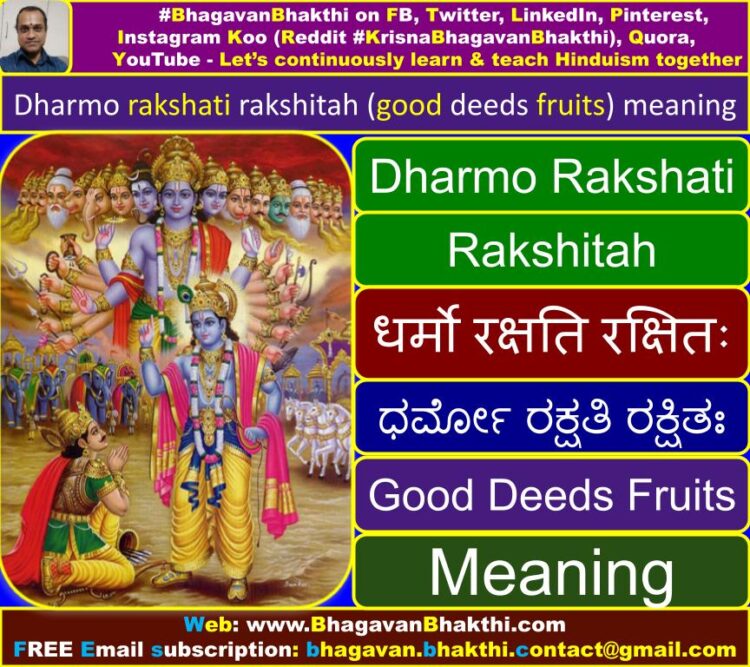
My dear friends, today let us know a very important concept in Sanatana Dharma (Hinduism) called as “Dharmo Rakshati Rakshitah“.
The meaning of Dharmo rakshati rakshitah (good deeds fruits) is as given below:
1. dharmō rakṣati rakṣitaḥ shloka : First of all, let us know this shloka and understand it’s meaning: धर्मो रक्षति रक्षितः / ಧರ್ಮೋ ರಕ್ಷತಿ ರಕ್ಷಿತಃ / dharmō rakṣati rakṣitaḥ (Dharmo Rakshati Rakshitah).
2. Meaning of the above shloka : dharmō rakṣati rakṣitaḥ : dharmō = Dharma (Sanatana Dharma), rakṣati = Who follows the Dharma, serves as per Dharma, protects the Dharma as per Sanatana Dharma, rakṣitaḥ = Will be protected by Dharma itself.
3. Follower of Dharma : Anyone who is following the Dharma as per Sanatana Dharma, someone who serves the Dharma, that is – For example serves his parents, looks after the family, takes care of the common people, is a great patriot, etc.
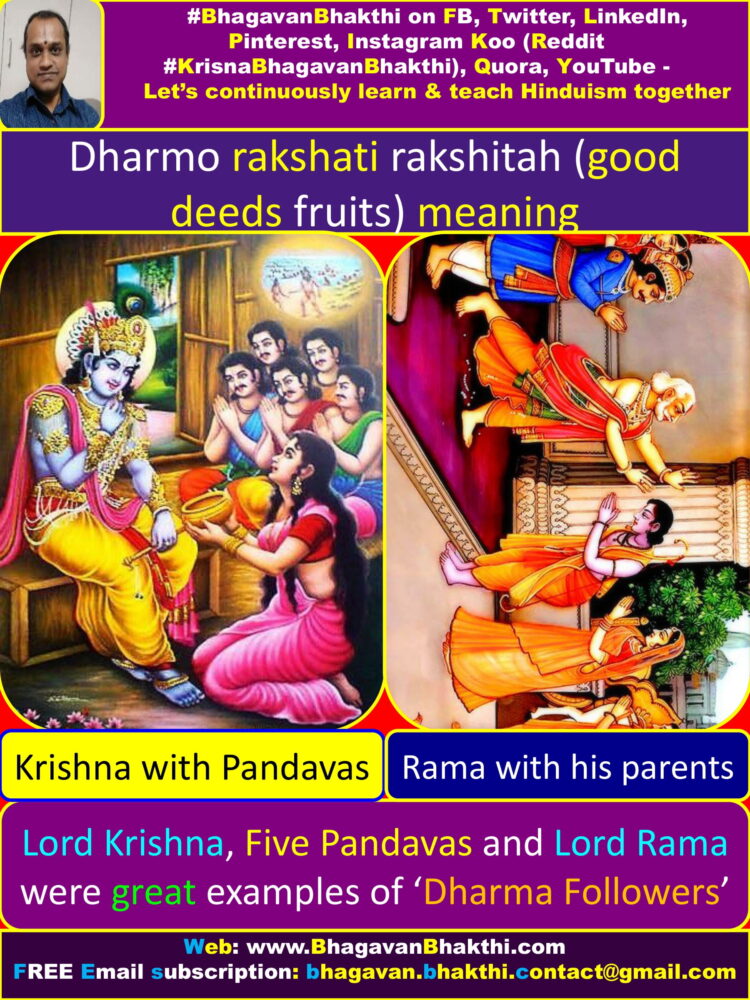
4. Obey Sanatana Dharma : Protects the country, follows the rules & regulations as per Sanatana Dharma, does the pooja of Bhagavan on daily basis, reads & teaches the Dharma, etc. will be definitely protected by Dharma itself.
5. Example of Dharma : This is happening even today. For example, if ‘X’ helps and / or protects ‘Y’ one day, then later someday or the other day, even ‘Y’ will also definitely helps and / or protects ‘X’. This is the nature of humanity at any given time.
6. Manusmriti 8.15 : The above shloka, that is, धर्मो रक्षति रक्षितः / ಧರ್ಮೋ ರಕ್ಷತಿ ರಕ್ಷಿತಃ / dharmō rakṣati rakṣitaḥ (Dharmo Rakshati Rakshitah) comes in the “Manusmriti 8.15”. Manusmriti was composed by the great King of Suryavanshi called ‘Manu (मनु / ಮನು / manu)‘
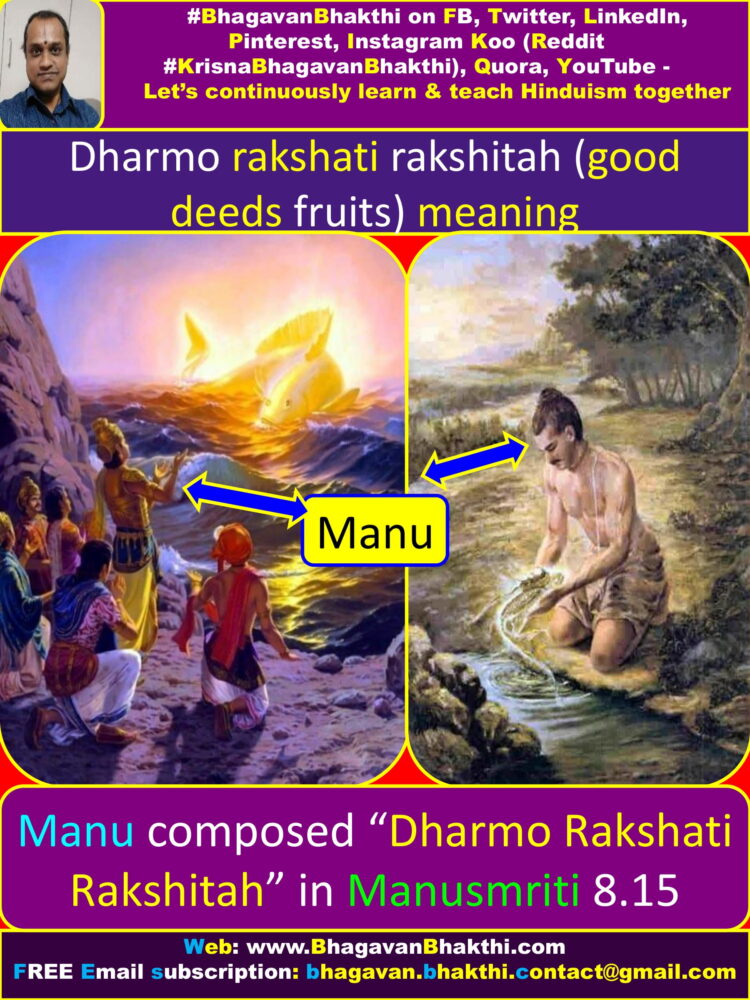
7. Taking examples : Let us further understand Dharmo Rakshati Rakshitah by taking examples from Mahabharata, Ramayana, etc.:
8. Lesson learnt from King Pandu and Kunti Devi : King Pandu and Kunti Devi had recognized like this: It is their duty that they should beget Dharmic (Divinely righteous) children who will protect the Dharma (righteous) in the society.
8a. As per Sanatana Dharma, it the duty of all the Kshatriyas to protect the Dharma (righteousness) and society from all the negative and evil forces.
8b. Thus, if someone protects the Dharma, in turn Dharma will protect the person / people who protects the Dharma. And thus, thereby the entire mankind (humanity) is automatically protected.
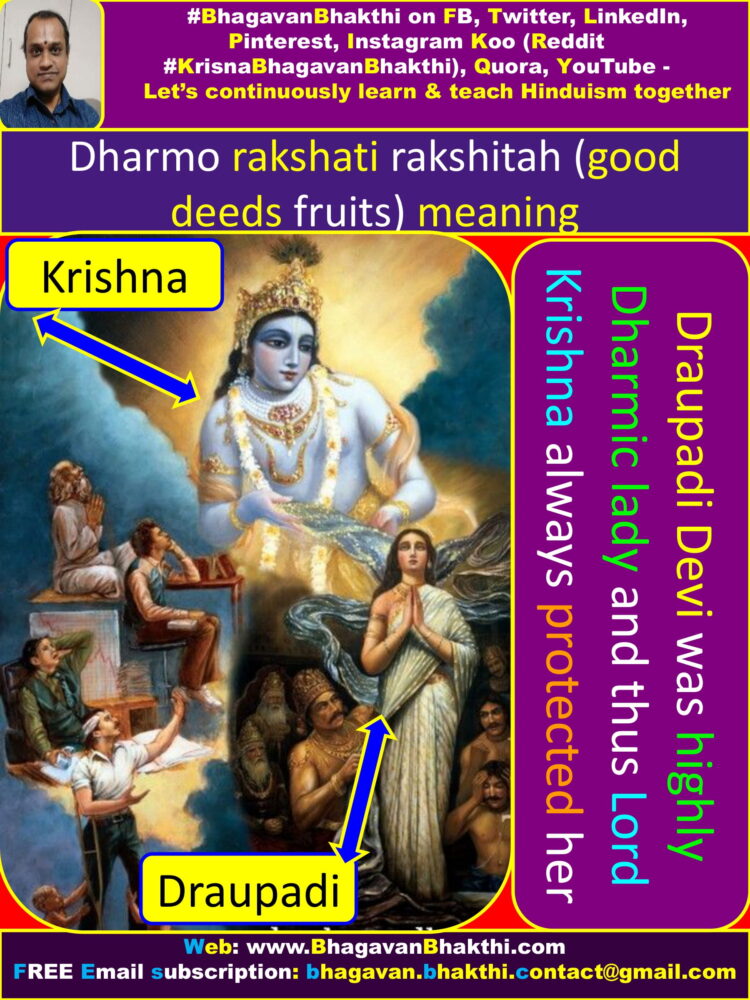
8c. For this main reason King Pandu and Kunti Devi along with Madri Devi beget five children known as the Pandavas (Sons of King Pandu).
8d. The first child was born from Lord Yama Deva and his name was Yudhishthira. He was the symbol of Dharma, as he was an avatar of Lord Yama Deva.
8e. Yudhishthira was a person who showed the world the right path (Dharma) through out his life. Also, he guided others too to follow the righteous path (Dharma).
8f. No law is effective if it is not enforced and it has to be obliged by each and everyone all the time.
8g. Enforcement of the any law (Dharma) is done by educating the common people and by the use of force to discipline the erring elements of the society.
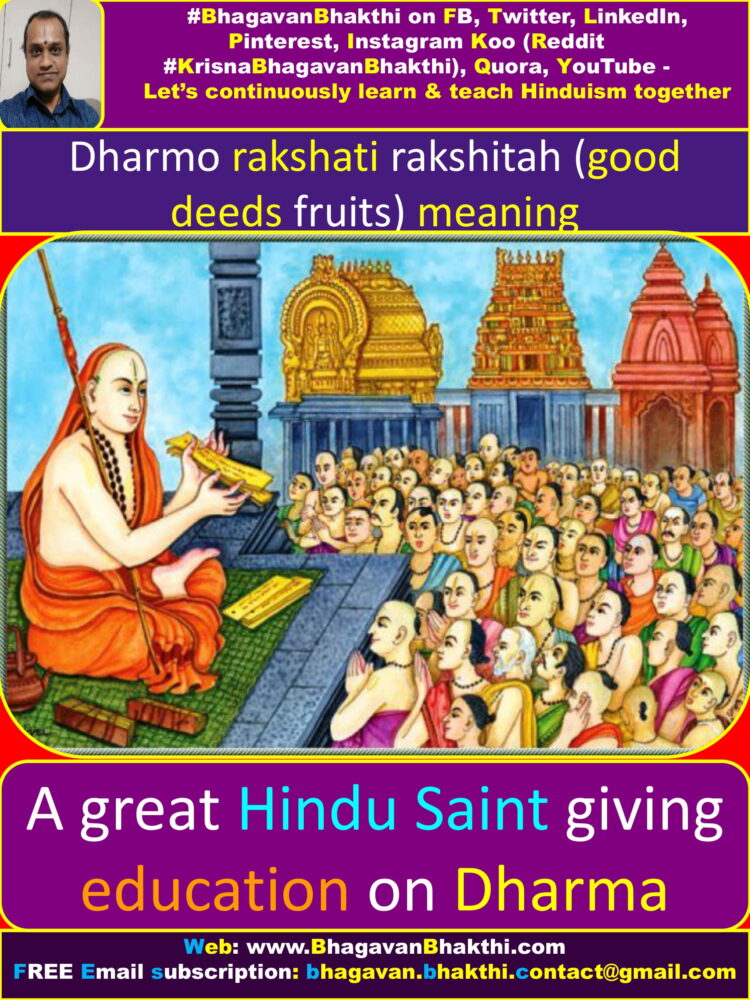
8h. Thus, with this purpose of protecting Dharma, King Pandu along with Kunti Devi beget their second son called Bhima.
8i. Bhima was an avatar of Lord Sri Vayu Deva. As is clear from the scriptures, the strength of all the Gods is Indra, Shiva is stronger than Indra, Vayu is stringer than Shiva and Lord Sri Vishnu is stronger than all.
8j. Lord Vayu Deva (Bhima) was a symbol of power, strength and also knowledge is a very high measure, as it is not enough only to have strength with zero and limited knowledge.
8k. Just like the government uses both arms of force as well as knowledge to enforce a law (Dharma), Yudhishthira is to be protected by the strength and knowledge of Bhima (An avatar of Lord Sri Vayu Deva) through out his life.
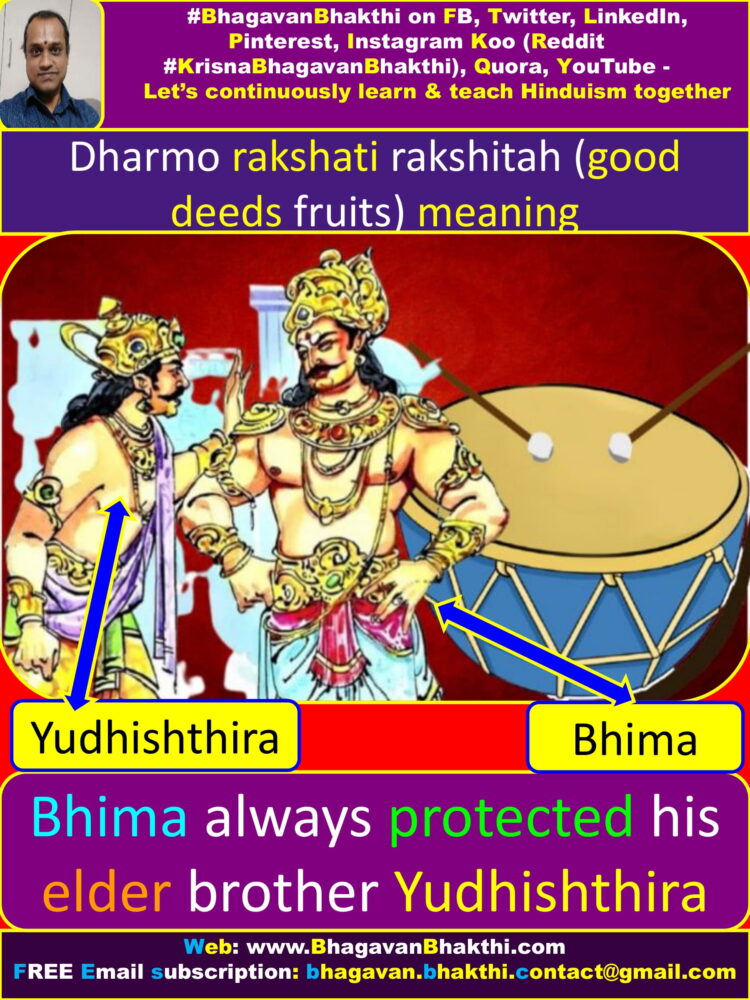
8l. ज्ञान / jñāna (Gyan / Gnana) or knowledge is to be provided to the society by the Brahmins, and protection through use of physical strength or Bahubala is to be provided by the Kshatriyas or the warriors.
8m. Providing ज्ञान / jñāna (Gyan / Gnana) or knowledge is the Dharma (duty) of Brahmins and providing protection Dharma belongs to Kshatriyas.
8n. One should also aim at building a strong mind and a strong body. If one of these aspects is absent it leads to an incomplete life. Bhima was an epithet of both strength and knowledge.
8o. Lord Vayu Deva (Bhima) apart from being strong and knowledgeable, he also responds immediately to the requests from people at any time and at any cost.
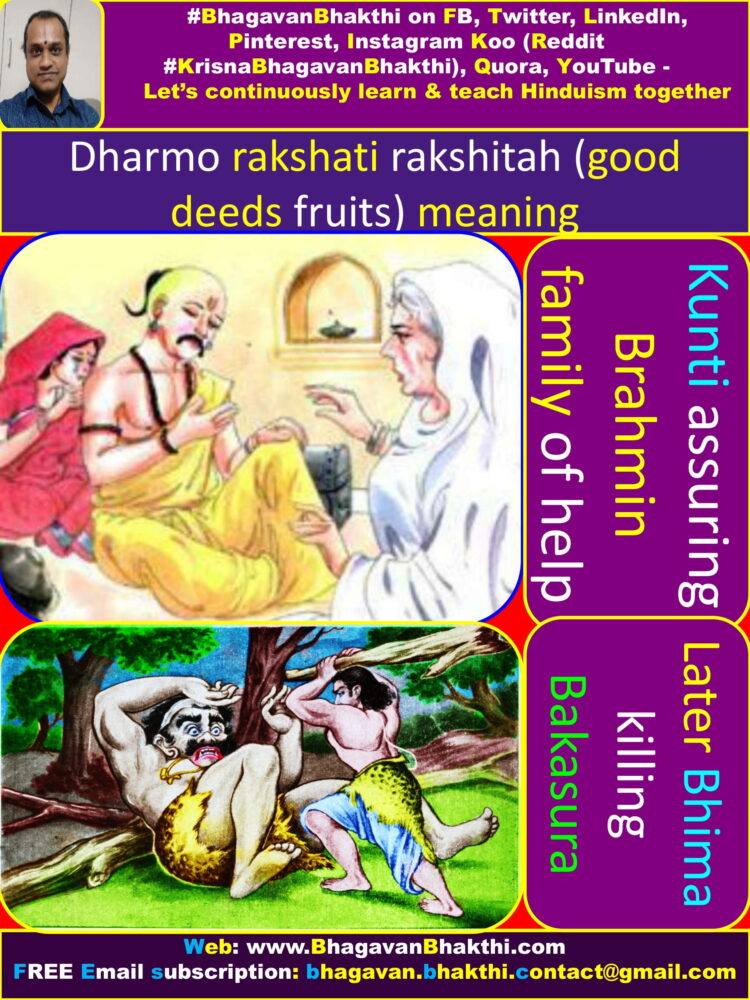
8p. King Pandu and Kunti Devi, in order to have a strong substitute for Bhima, they beget their third son and his name was Arjuna.
8q. Arjuna was an avatar of Lord Indra Deva, that is, he the king of the Devatas (Demigods).
8r. Both Bhima (Lord Vayu Deva) and Arjuna (Lord Indra Deva) served as the strength for the Pandavas through out their life.
8s. Similarly, King Pandu and Madri beget two sons called Nakula and Sahadeva. They both were avatars of Ashwini Kumaras. They both symbolized character and modesty. Simple living was their persona.
Both Nakula and Sahadeva served as essential complements to Dharma, Strength and Knowledge.
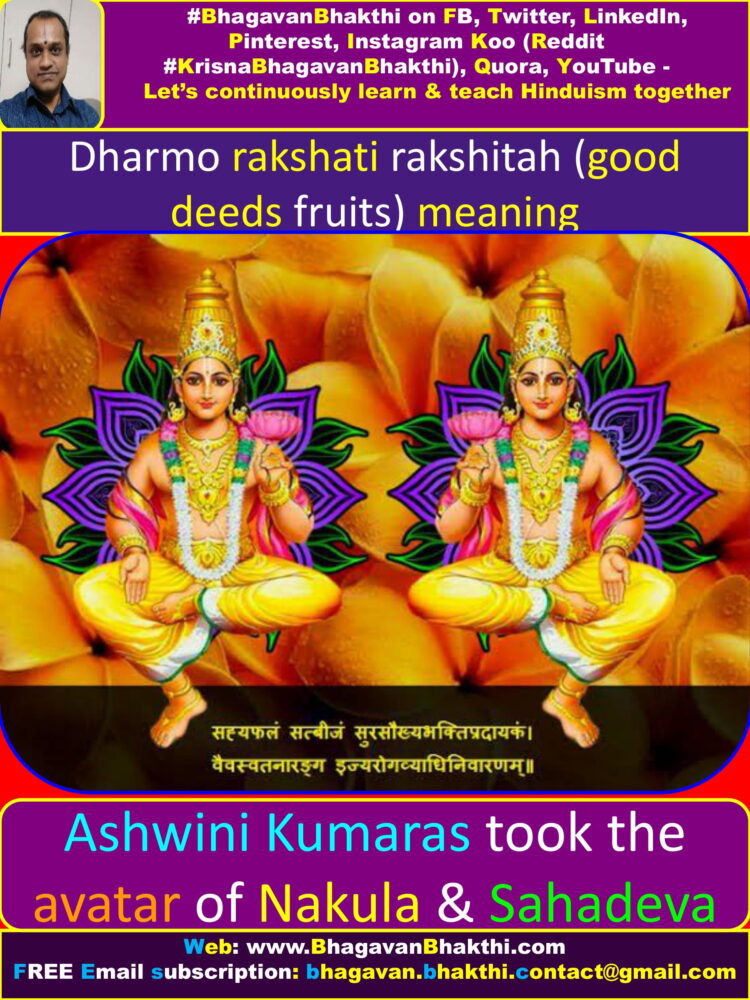
9. Role of Kunti Devi : Kunti Devi was an unique example of how a woman despite facing severe adversities through out life, comes out highly successful.
9a. As a young widow, she faces the cruelties and partisan behavior of her brother-in-law, Dhritarashtra, towards her children. But overcomes the same owing to her strong faith in Lord Sri Krishna and her son, Bhima.
9b. Kunti Devi’s character is highly distinctive that Lord (Sage) Sri Veda Vyasa Ji mentions at the beginning of the Mahabharata – that one of the purposes of writing the epic was to introduce the character of Kunti and the valuable lessons that she gives to humanity which is applicable even today.
9c. Kunti Devi’s strong and undistinguished faith in Bhima’s abilities is witnessed consistently throughout the Mahabharata story and especially manifests in the story of the killing of Bakasura.
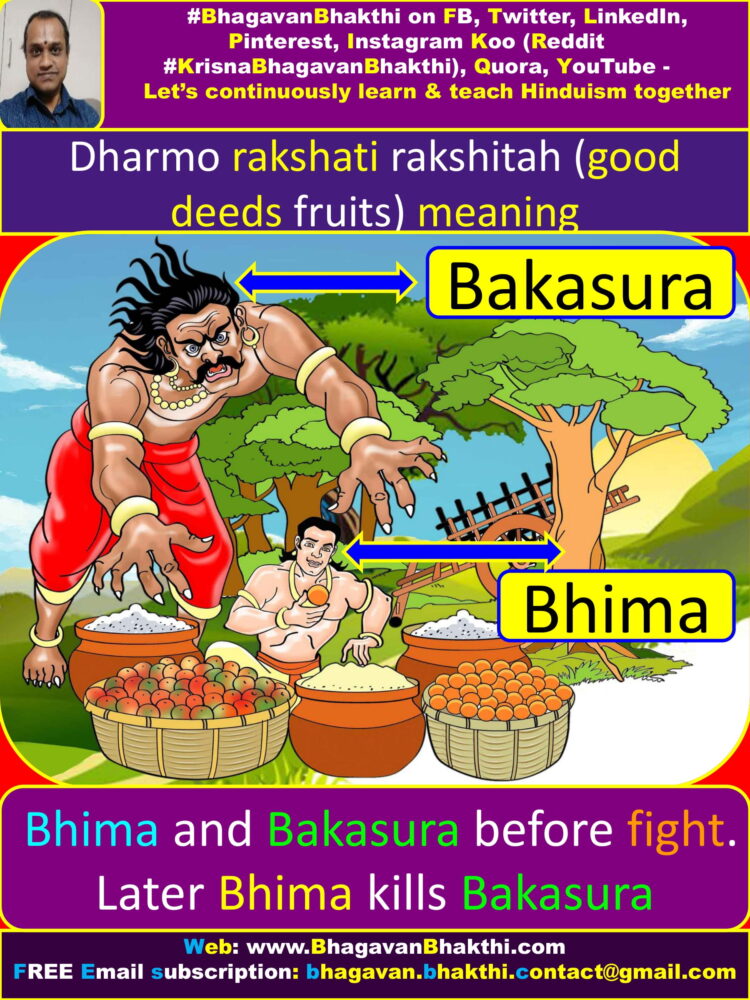
9d. When Kunti Devi offers to send Bhima to kill a demon called Bakasura (Another Bakasura was killed by Lord Sri Krishna), everyone including Yudhishthira is shocked and questions Kunti Devi’s prudence in doing so.
9e. For this, Kunti Devi replies that she has full faith in Bhima’s strength and knowledge ever since she saw him at birth.
9f. Bhima as a ten day old baby slips off the hands of Kunti Devi and falls on a rock.
9g. When a wailing Kunti Devi runs towards the rock, she was completely surprised to see that Bhima is intact and the huge rock had been torn to pieces.
9h. Kunti Devi, then concludes that there is no situation that can harm Bhima and also in turn Bhima can always save people. This is called as ‘Dharmo Rakshati Rakshitah‘.
9i. Bhima was a great supporter of Dharma and thus Dharma always supported him through his life.
9j. Kunti Devi remains unbiased towards her children (Yudhishthira, Bhima and Arjuna) as well those of Madri Devi’s (Nakula and Sahadeva), and never gives them a step motherly treatment through out her life.
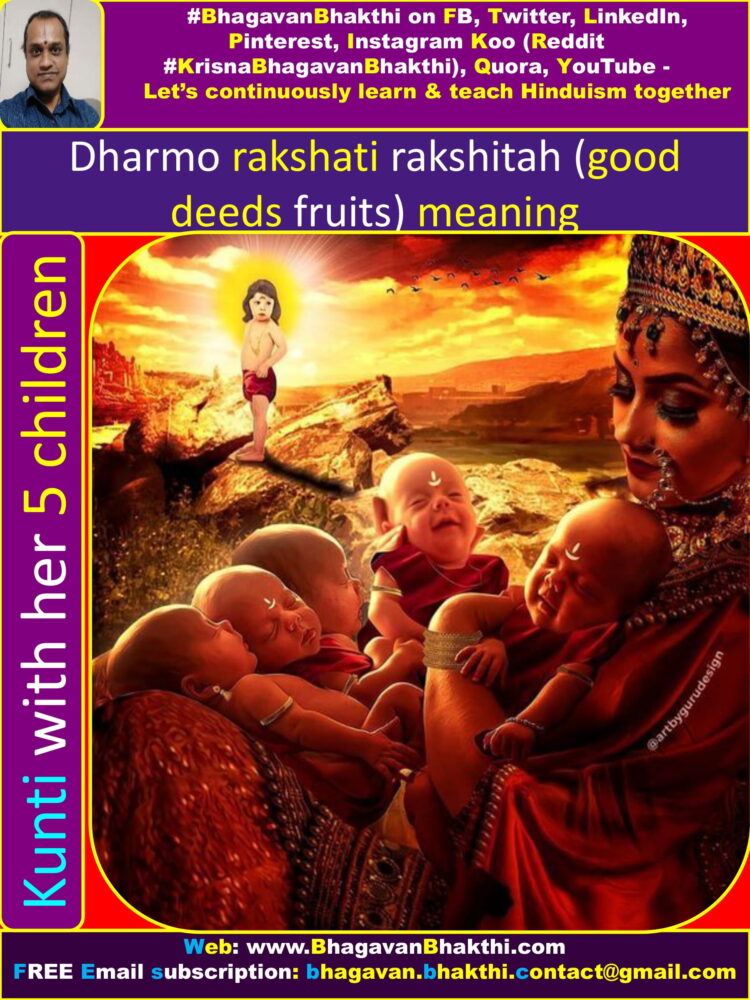
10. Dharma lessons from Yudhishthira : During the Yaksha Prashna incident, Yudhishthira displays the highest knowledge, highest maturity, super calmness and highest knowledge of a righteous king (Dharma King).
10a. By giving an unbiased treatment to Madri Devi’s sons, Yudhishthira displays how one should follow Dharma at all times.
10b. Yudhishthira shows how one should follow the law (Dharma), but also the spirit and intent of the law (Againa Dharma).
10c. During the Yaksha Prashna incident, after Yudhishthira successfully answers all the questions posed by Yaksha Raja, he is asked as to who amongst his brothers would he want to come alive. Without any hesitation he says that Nakula who is the son of Madri Devi should come alive.
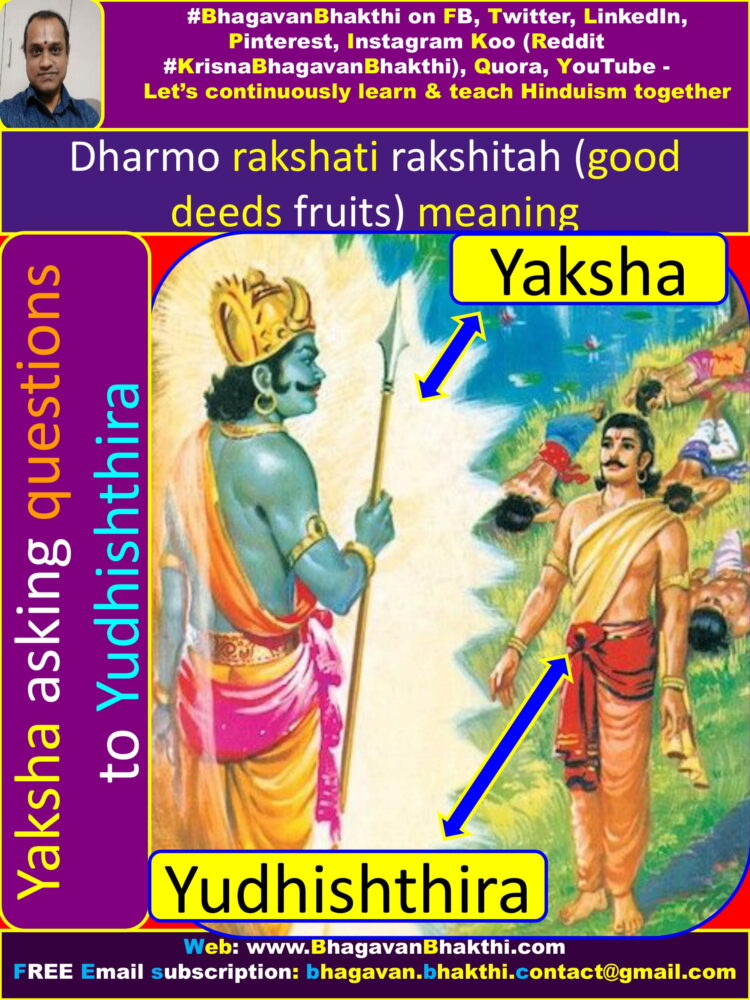
10d. When asked the reason for the same by Yaksha Raja, Yudhishthira says that – since he is alive and is the elder son of Kunti Devi, one son of Madri Devi should also be alive, lest he be seen as partisan towards Kunti Devi’s son.
10e. Here Yudhishthira displays the highest standards of ethics (Dharma), because with just one year before the Mahabharata war, any lesser person would have been tempted to have the powerful Bhima or the great archer Arjuna alive, fight and win the war but he thinks otherwise.
10f. This is called Dharmo Rakshati Rakshitah. Yudhishthira protects Dharma and thus finally Dharma protected Yudhishthira.
11. Dharma in Bhagavad Gita : Just before the beginning of the Mahabharata war, in a classic case of wrong thinking by Arjuna, Arjuna refuses to fight the war citing his family, elders, emotions and why he thinks the war itself is inappropriate.
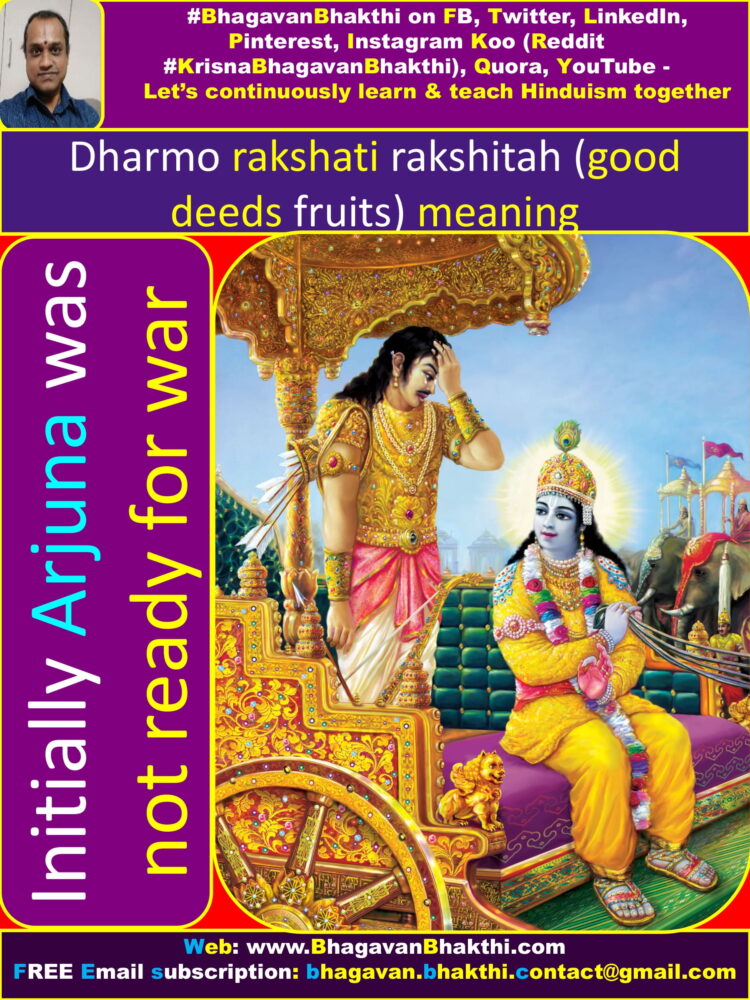
11a. But Lord Sri Krishna sets aside all his comments and arguments, and implores him to fight the war stating several examples of Dharma.
11b. Lord Sri Krishna gives Arjuna an important message to fight the war without expecting any fruits, and also advises Arjuna that one should perform one’s duties in accordance with Dharma and not be diverted into lesser and inappropriate issues which are against Dharma.
12. Laziness : There is always a tendency to keep on postponing and procrastinating the highest priority works.
12a. Few people always says that he / she will do tomorrow that work later or tomorrow. This happens even though he / she is capable of doing that particular work immediately.
12b. Here the assumption someone takes is that, one will easily thinks that he / she will be alive tomorrow, and be fit both mentally and physically to perform the same later or tomorrow.

12c. We know from our surroundings that, there is so much uncertainly around us that one is not at all assured of the future. One should immediately act on the knowledge one gets, however limited the knowledge is, and thus should and must perform the prescribed duty immediately.
13. Story on Dharma from Hindu Puranas:
In a place called Aruṇāspadam, once upon a time, there used to live a brāhmaṇa gṛhastha (householder) by name Pravara. Pravara used to do atithi-abhyāgata seva always (serving the guests wholeheartedly).
He had great interest in doing Tīrtha-yātras (visiting pilgrimage places). He used to give ātithyam (hospitality) to people who returned from Tīrtha-yātras and was always in knowing the Yātra-viśeṣhas (what all happened during the pilgrimage) from them.
Once a great Siddha (learnt man), who in a very young age did many Tīrtha-yātras, came to Pravara. Pravara gave atithyam (hospitality) to him, did satkāram (treating well) and asked him how he was able to travel so many Divya-kṣhetras (divine pilgrimage place) at such a young age.
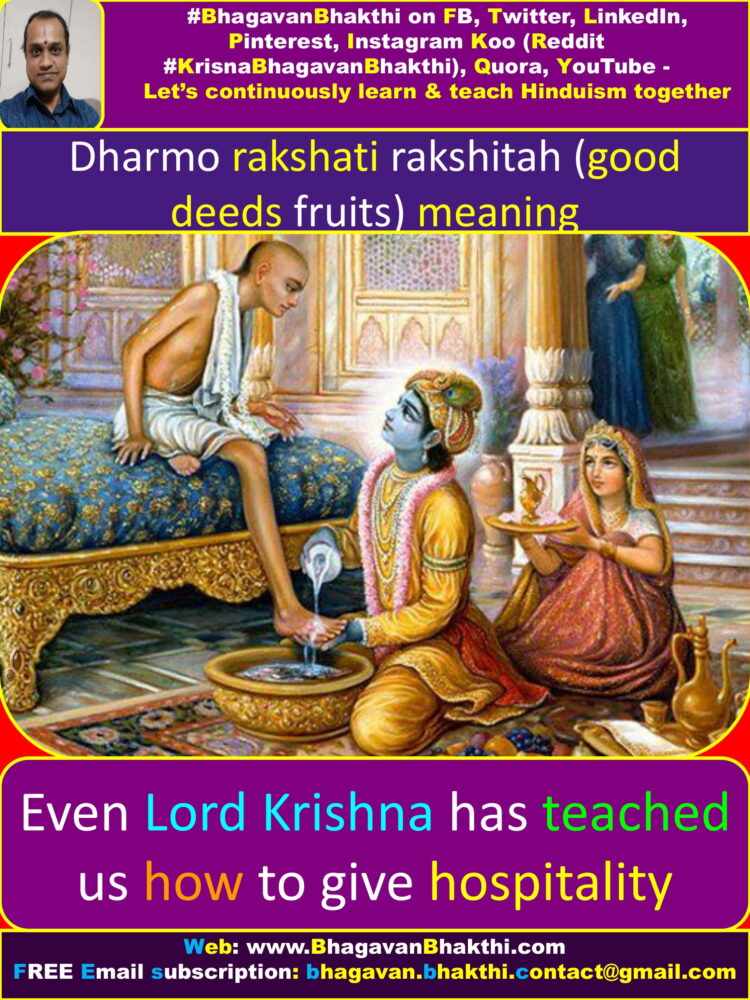
The Siddha (learnt man) told him that he had a Divya Pāda-lepanam (divine ointment of legs) with him which can take him to whatever place he wants to go in no time. The Siddha (learnt man) gave Pravara the Pāda-lepanam (divine ointment of legs) and went away.
Pravara did all his nityānuṣhṭhānas (household chores), did all the work needed to be done for his Māta-Pita (mother and father), others, gave the responsibility of atithi satkāram (to look after the guests) etc. to his wife Sahanaśīli,
took the anujña (permission) of his parents and with the saṅkalpam (determination) of returning back by the time of Sāyam sandhya (before sunset). Thus he started to see the Divya Siddha-pradeśas (divine pilgrimage places), Kṣhetras (divine places) in the great Himālayas using the Pāda-lepanam (divine ointment of legs).
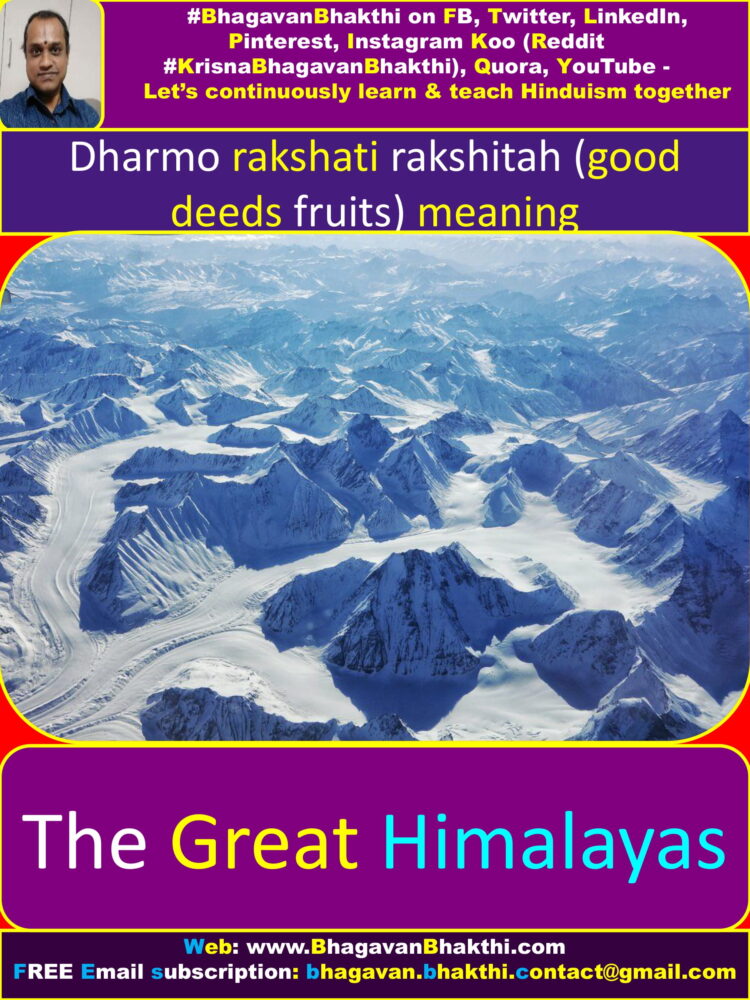
From the Ākāśa-mārgam (space) itself he saw the great Himālayas, the puṇya ṇadīs (divine rivers), Tīrthas (divine pilgrimage places). The sounds of the flows of water were like mṛdaṅga-dhvani (sound of divine drums) and the peacocks (mayūra) responded to the dhvani (sound) by dancing, with their feathers open.
He saw, with surprise, the female elephants shaking the huge trees with their trunks, in the forests. He said to himself, “Āha! The beauty of the Himālayas can it be explained by Brahmadeva Himself?
Due to the Sūrya ātapam (sun light) snow used to melt and fall on the heated Sūryakānta maṇis (divine pearls) and immediately evaporate with “chisss” sounds. Knowing that it became Madhyāhnam (afternoon), he thought that it was enough for that day and he can return the next day to continue his Yātra (pilgrimage travel).
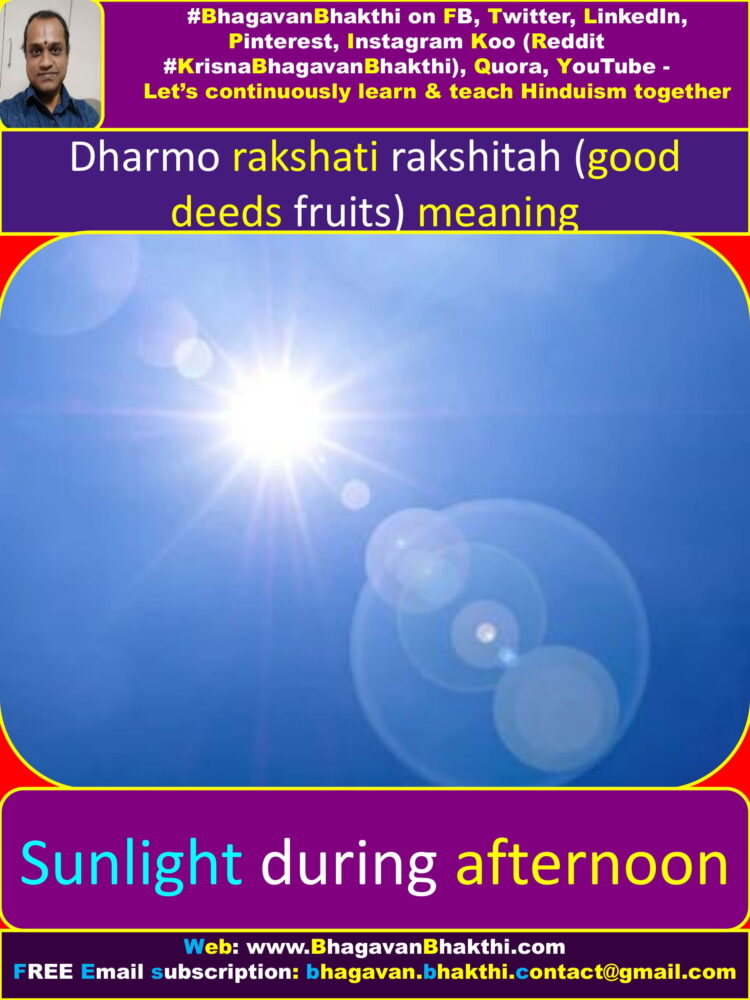
But Pravara was not able to move. He realized that the Pāda-lepanam (divine ointment of legs) got melted in the ice-water. He became a niśceṣhṭa (immobile).
He thought “O Bhagavān! What strong Karma-pāśam (noose) is this?” “With the help of Siddha I came such a great distance from my house.” “Where is Aruṇāspadam and where is this place. Why did I act in haste, without thinking much?”
He became sad thinking about his parents, who would search his entire village if they don’t see him for a minute.
He thought: What will be the situation of my Bhārya (beloved wife), who follows me like a shadow? How sad will my Śiṣhyas (students) be not seeing me? Who will do the necessary arrangements for Atithi-abhyāgata satkāras (serving the guests)?
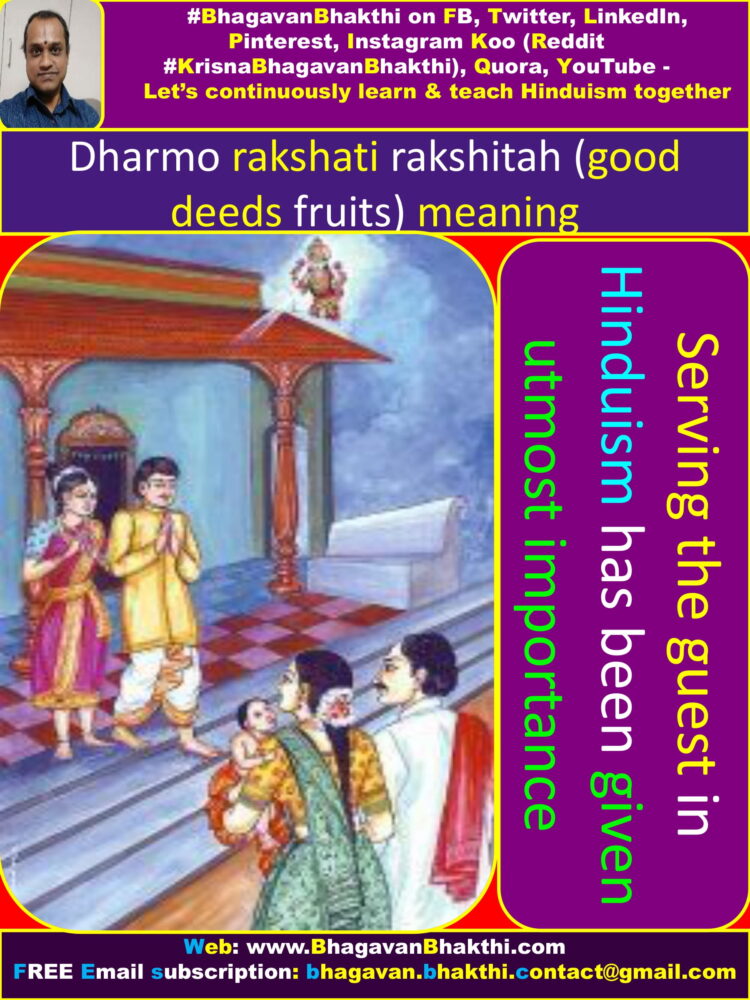
What about the nityāgnihotras (divine ceremonies)? Even my nitya-anuṣhṭHānas (divine household chores) will be stopped is it? O Bhagavān! No one else must face a situation like this.
Seeing this Pravara, a Gandharva kanya (divine woman) by name Varūdhinī came and tried to do attract Pravara. Not knowing what to do Pravara maintained maunam (silent).
One side was Varūdhinī who was doing Śruṅgāra-ceṣhṭas (trying to seduce) and on the other side it was getting time for his nityānuṣhṭhānas (divine household works). As the Sūrya-bhagavān (Sun God) started to set, Pravara thought his jīvitam (life) is becoming vyartham (waste).
He got bhrānti (illusion) and thought “is all these days of my Anuṣhṭhānas (divine works) be waste?”
Believing in Agnideva — manasā (from mind), vācā (from words), karmaṇā (Karma), Pravara controlled Varūdhinī,
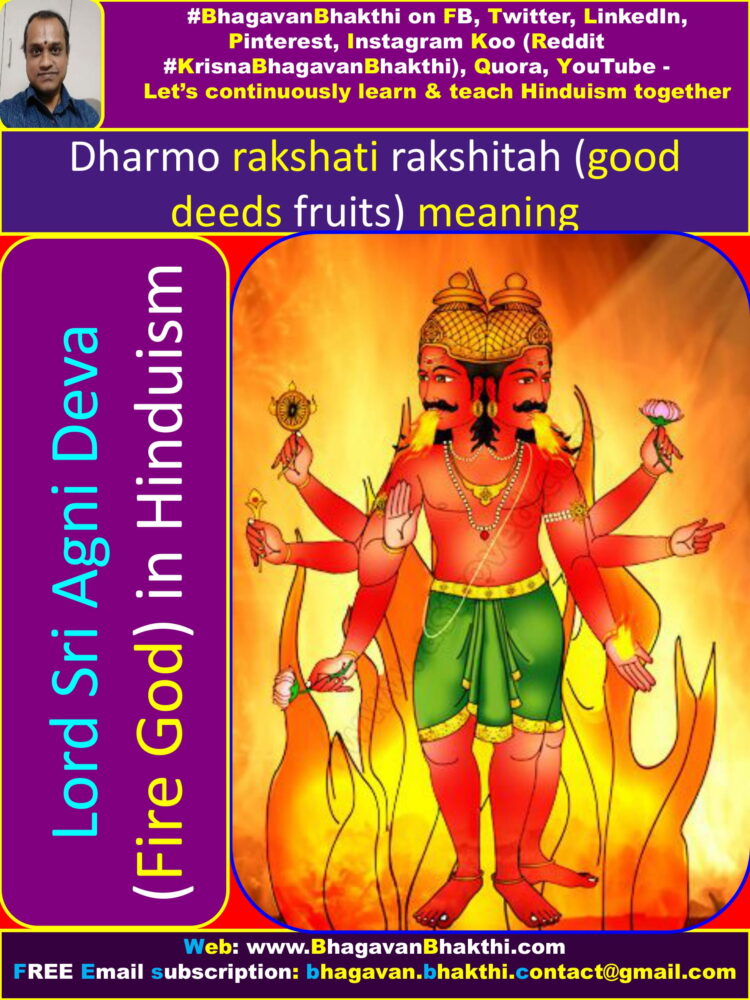
with dṛḍha saṅkalpam (firm determination) of doing his Anuṣhṭhānas (divine works) and said to himself: “if I really do all my duties, follow the path of Dharma and am I nityānuṣhṭhāna-tatpara (person following the Dharmic works), then may the Agnideva show me the way”.
The next moment Pravara was in his house at Aruṇāspadam. He did kṛtajñatas (gratitude) to Karmasākṣhi (Karma done in the Dharmic way), Agnideva and brought back happiness to all his family members.
PS: He we should note that, the divine works done in our earlier life’s (present and before) will come in the way. If we are doing the Dharmic Karmas, definitely these Karmas will help us in getting out of the heinous situation.
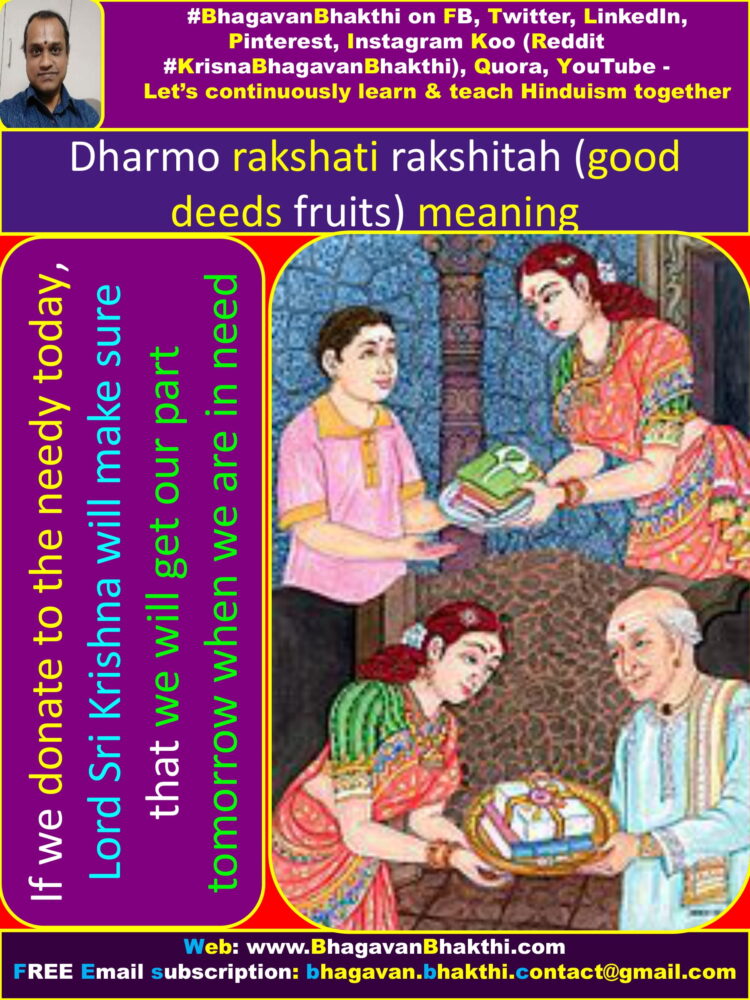
Similarly if we have Adharmic Karmas means, definitely these Karmas will make us to fall into the bigger ditch. Just praying when we are in difficult situation won’t be helpful. We have to do Dharmic works throughout our lives, to get out of difficulties and can’t be done in one day or in few moments.
For example, if a child is going to school. He / She has to study throughout the year to get good marks. Just studying one day before or few days before won’t help much.
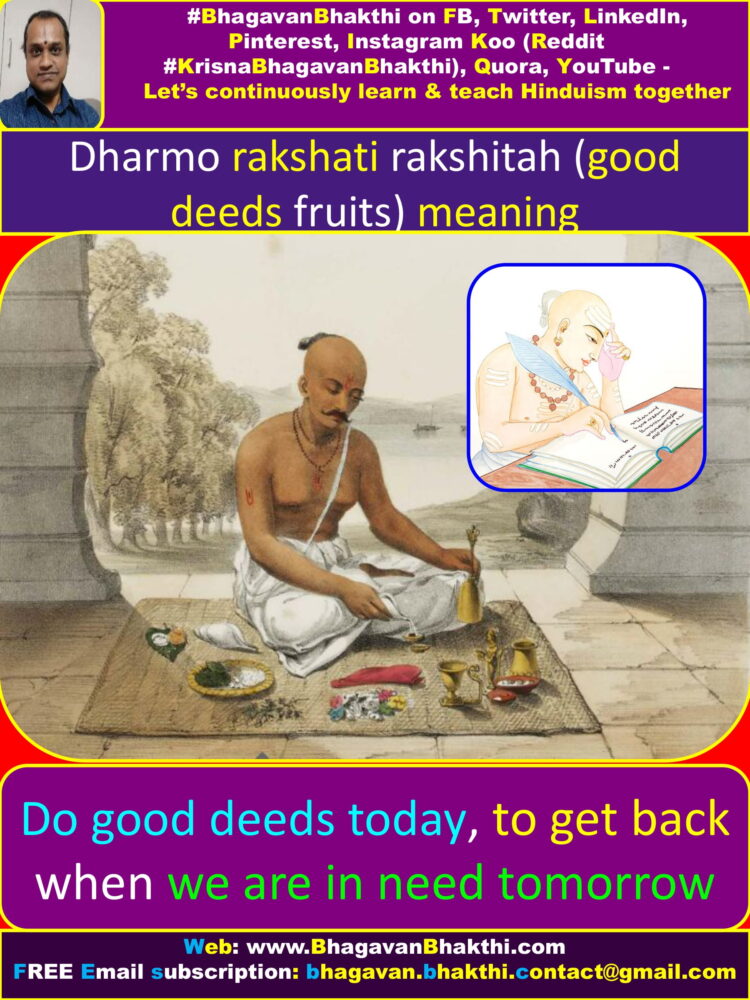
More information will be added to this on regular, please visit after some time to know more information.
To watch videos on #Hinduism #Sanskrit language, SUBSCRIBE to my YouTube channel from this below link:
#BhagavanBhakthi YouTube channel
To know more information “About Hinduism (Sanatana Dharma) unknown facts“, please click the below link:
About Hinduism (Sanatana Dharma) unknown facts
Dear friends, if you need any clarifications about this post, kindly let me know, I will definitely try to answer all of them.
Also your one LIKE, one COMMENT, One Share, one SUBSCRIPTION is highly important.
This will help to know the quality of this content and also it will be helpful to know if any improvements is required for the content.
If you feel this content is useful to you and has helped you to improve your knowledge, kindly share this with your well-wishers.
Because “SHARING MEANS CARING”.
For receive FREE EMAIL SUBSCRIPTION about #BhagavanBhakthi, you can send an email to [email protected] from your email ID.
NAMASTE!
SRI GURUBHYO NAMAHA
OM NAMO NARAYANAYA
Sri Krishnaarpanamastu
What a beautiful and enlightening blog post! Thank you for sharing your insights.
What a beautiful and enlightening blog post! Thank you for sharing your insights.